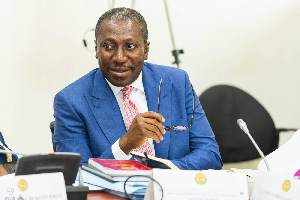A member of the Public Accounts Committee (PAC) and National Democratic Congress (NDC) Member of Parliament for Shai-Osudoku, David Tetteh Assumeng, alleged at the public hearing of the committee Wednesday that his independent investigation had revealed massive rot at the central medical stores of the Ministry of Health, which the authorities needed to take serious notice of.
He made the revelation when officials of the Ministry of Health led by the Deputy Minister, Dr Tia Sugri, as well as its allied bodies appeared before the committee yesterday to answer questions on the performance audit report of the Auditor-General, on the management and distribution of anti-retroviral drugs in Ghana.
He said those working at the central stores were alleged to be involved in a syndicate diverting drugs meant for public use and selling them at huge prices on the black market.
The committee members were particularly concerned about shortages of anti-retroviral drugs in health facilities and also the delay in clearing drugs that were imported from abroad for use by those living with HIV/AIDS.
The Auditor-General had reported that two consignments of anti-retroviral drugs totalling GHc323,000 were not delivered even though monies had been paid for the drugs. But answering queries on it, the programmes manager of the National AIDS Control Programme (NACP) of the Ministry, Dr Nii Akwei Addo, tried to discredit that information from the Auditor-General saying that it was not true that those contracts were not delivered and that all contracts paid for had been delivered with documents covering them.
Officials from Auditor-General’s Department at the hearing expressed shock at Dr Addo’s denial of the revelation and produced a performance letter that was written by the programmes manager himself dated December 11, 2011 indicating that all deliveries of anti-retroviral drugs had been made, except two, even though monies for them had been paid for.
There were also reports from some hospitals such as KNUST Hospital, Yendi Hospital, Sandema Hospital and Holy Family Hospital indicating that monies collected from HIV patients who visited the health facilities for diagnostic tests, were not properly accounted for and that some officials from those health institutions were made to answer for them.
Officials of the National Health Insurance Authority (NHIA) also appeared before the committee to answer queries on an amount of GHc6.4 million that could not be accounted for when officials of Auditor-General audited them.
The deputy chief executive officer of NHIA in charge of operations, Nathaniel Otoo, who led the NHIA team, said the NHIA had taken steps to recoup the money which, according to him, had been incurred as a result of over-payment for claims and misappropriation on the part of some employees of the NHIA.
He noted that the actual amount that was lost to over-payment and misappropriation by their audit was GHc22 million of which GHc8.8 million had been retrieved.
According to him, some of the erring officials have been taken to court for the money to be retrieved.
He said the modus operandi had been that people printed fake prescription forms and prescribed all forms of drugs that were paid for, but in actual fact, those prescriptions did not come from accredited medical facilities.
He said the Authority, realising this anomaly, had suggested to the Ministry of Health and other health institutions to serialise its prescription forms so that duplicate ones could be detected.
General News of Friday, 23 August 2013
Source: Daily Guide
Rot at Ministry of Health

Entertainment











